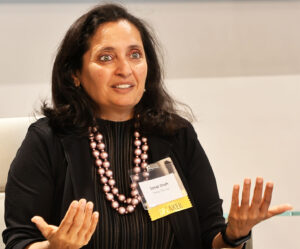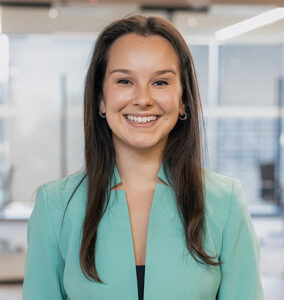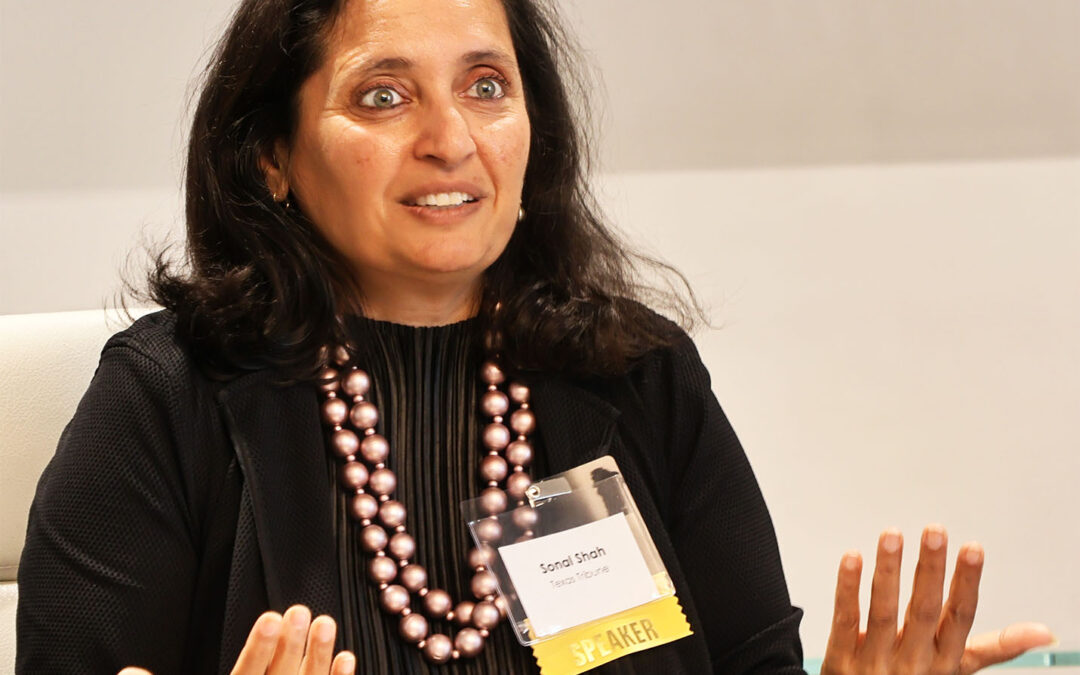[WCA Leader Lunch Recap by Katiana Krawchenko]
Since 2005, Texas has lost more newspaper journalists per capita than all but two other states and of Texas’ 254 counties, 27 no longer have a newspaper. The Lone Star state is the nation’s second largest with 30 million residents. It grew in population by 50% between 2005 and 2022, the fastest of any state in the country. During the same period, it lost 65% of its newspaper journalists.

Photo by Hope Capwell, WCA Intern
Statistics like these serve as a guiding light for Texas Tribune CEO Sonal Shah’s leadership at the news outlet. Her drive is to create a more informed and engaged public through thoughtful and solid local news reporting — and, importantly — solid partnerships with various types of news outlets and community organizations to keep news reporting alive in the future.
“Journalists are going to be on TV, radio, and digital altogether; it’s not going to be one or the other,” Shah posed at a July 11th WCA Leader Lunch in downtown Austin. “I think we’re going to have to figure out how to collectively work together to continue to invest in journalism together.”
In her year and a half at the helm of the Tribune, the state’s only member-supported, digital-first, nonpartisan media organization, Shah has relied on strengthening partnerships both within communities and with other news outlets as a way to also strengthen civic engagement.
Shah noted that she and her team are in talks with outlets of various mediums to examine the question of how to build partnerships to determine how to do things together. Can reporters be shared? Can money be raised to pay for a reporter’s salary?
“I think the collective is much bigger than any individual. None of us can individually hire enough journalists,” Shah said. “But we can do it more and we can do it in partnership.”
Another major challenge for Shah is communicating to people why it is important to have news in communities. While so many of us take it for granted, the fact that nearly 10% of Texas’ counties have no news being reported keeps her up at night.
“When we think about what that means in communities, it’s not just that there’s not news. It’s that there’s no record of what’s actually happening — what’s happening in the city council, what’s happening in communities, how are policies or other things affecting people’s lives? How do people experience things?” she said.
Shah’s concerns are backed by innumerable data points. According to the Local News Initiative, a project of Northwestern University’s Medill School of Journalism, on the current trajectory, by the end of next year, the country will have lost a third of its newspapers since 2005.
“Discouragingly, the growth in alternative local news sources — digital and ethnic news outlets, as well as public broadcasting — has not kept pace with what’s being lost,” the organization’s 2023 report notes. “As a result, most communities that lose a local newspaper — usually a weekly — do not get a replacement. Those communities are typically poorer and without access to high-speed broadband that would connect them with other reliable news sources in their region, state and nation.”
“So if we can collaborate better and do more together to expand out the ability to have more investigations, more accountability, more service journalism,” Shah said, these partnerships can create a more connected and engaged public both in Texas communities and around the world.
Blog Author:
 Katiana Krawchenko specializes in nationwide TV and radio outreach, client management and strategic broadcast media plan development in her position as senior director of broadcast media at the DC-based public affairs agency, Avoq. Prior to joining the team, Katiana served as a CBS News White House producer, traveling around the U.S. and to several countries covering President Trump. She previously worked with CBS affiliate services, CBS This Morning and the CBS political unit, covering the 2016 election. Katiana hails from Winnipeg, Canada, and found her way to Austin in 2023 after working in Washington, D.C., at Avoq for three years. She spends her spare time cuddling her rescue dogs, Binkie and Linguini, and hanging the esoteric art she regularly finds on the street and at flea markets.
Katiana Krawchenko specializes in nationwide TV and radio outreach, client management and strategic broadcast media plan development in her position as senior director of broadcast media at the DC-based public affairs agency, Avoq. Prior to joining the team, Katiana served as a CBS News White House producer, traveling around the U.S. and to several countries covering President Trump. She previously worked with CBS affiliate services, CBS This Morning and the CBS political unit, covering the 2016 election. Katiana hails from Winnipeg, Canada, and found her way to Austin in 2023 after working in Washington, D.C., at Avoq for three years. She spends her spare time cuddling her rescue dogs, Binkie and Linguini, and hanging the esoteric art she regularly finds on the street and at flea markets.
- Ask a Peer Mentor: Should I stay or should I go now? - May 13, 2025
- Ask A Peer Mentor: How can I find clients for my new consulting practice? - January 24, 2025
- Ask a Peer Mentor: Why do I feel like a fraud? Overcoming Imposter Syndrome. - January 10, 2025

